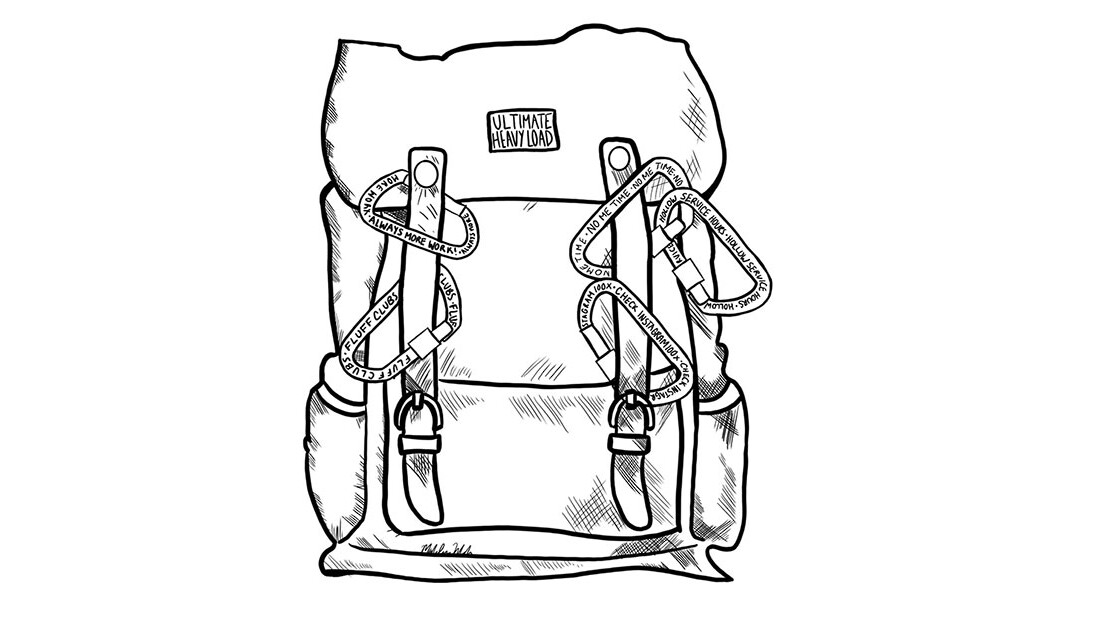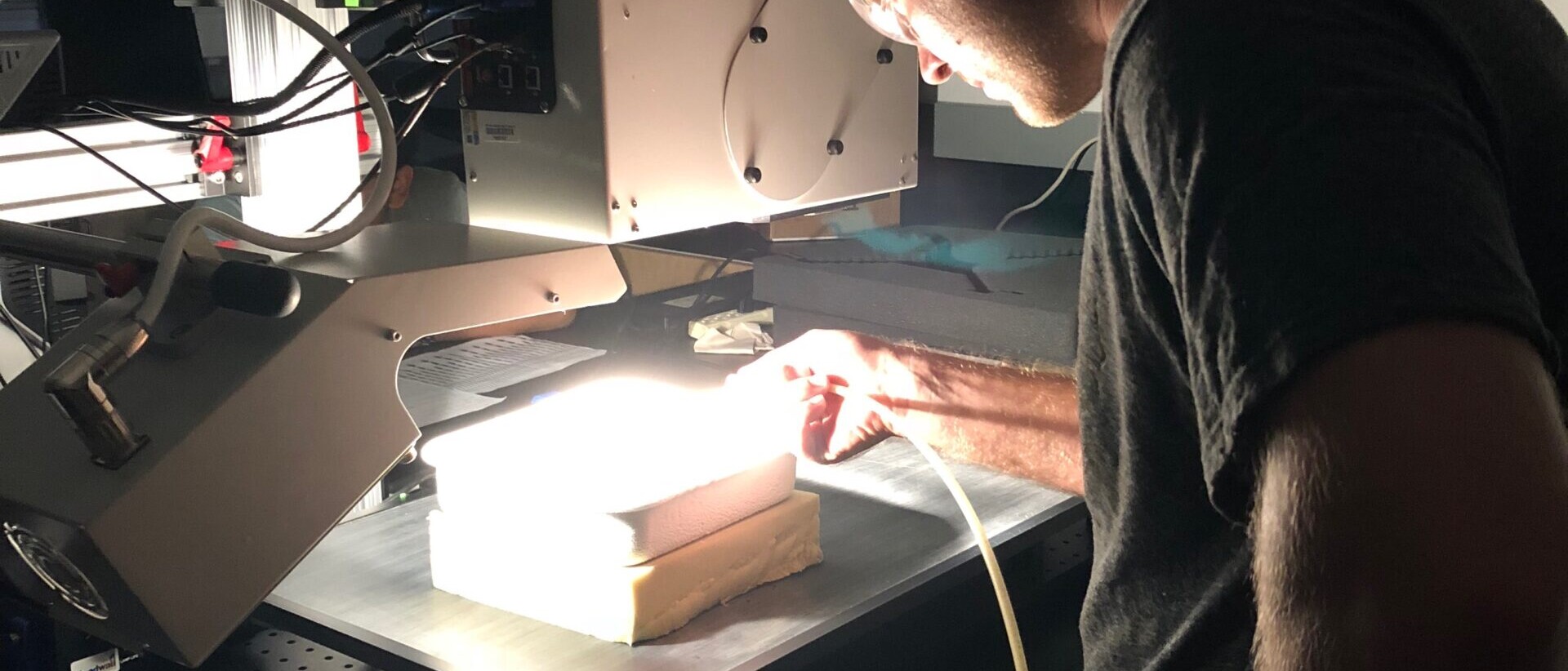How Heavy Is Your Backpack?
While I was walking through the snow (yes … we still get snow in March in Rhode Island) with one of my best friends a few weeks ago, she began telling me about a coaching framework she’s been working on—centered around a backpack. My friend Brountas (I call her by her last name … something that stuck during our college years together) owns an executive coaching business (https://www.linkedin.com/in/jen-brountas-16b731/). She uses the backpack analogy as a way to help her clients prioritize the things occupying their headspace. A backpack is a useful tool, but it has a limited capacity and a tendency to collect stuff that weighs you down. I couldn’t help but think that her framework and analogy could benefit my students as they transition into a post-pandemic world.
Brountas described her backpack idea as a way to talk about what feels awful and what feels good in our lives, and the consequences of letting the best parts of ourselves get lost in the load. I think a lot of my students would agree that the weight of junior and senior year of high school can “feel awful and overwhelming ” just like the weight of a too-heavy backpack. Everything about these later years of high school feels important … there is so much pressure to have just as heavy a backpack as everyone else, especially when thinking ahead to college. In fact, students often tend to “clip on” more responsibilities, like carabiners that create more weight on their shoulders.
“Think about what you miss and don’t miss” is a phrase I’ve heard many times over the course of the last year. I think most of us can quickly rattle off a few things we’ve missed throughout the pandemic and others we would happily toss out of our bags. It’s fun taking the time to reflect, but it’s much harder to actually leave some of your old life behind—to physically remove the weight or change the way you engage with the items that gnaw at your side. This spring, don’t just think about what’s next; instead, take action and make the leap forward to make your high school years the best they can be. A “big” bag full of all the right “things” doesn’t need to be heavy.
Stop & Unpack:
What “Rona” (as my students like to call the virus) did was force you to stop. It forced you to put aside your heavy load for a while. As Brountas says, “Feel the release. Step away from the bag and be conscious of what’s going on so that you can have a fresh perspective.” Before you sling the heavy bag back on your shoulders, I encourage you to unpack each item and sift out the “trash.” Is sitting on the bench at your team’s games getting you down? Maybe let that go and pick up something that makes you feel lighter and better represents the person you’re becoming.
Sort:
Sort the commitments in your life into categories: activities, clubs, the classes you’ve signed up for, jobs, internships, projects, time for sleep, time with friends and family, etc. What means the most to you? What would you like to leave behind? This act of reprioritizing isn’t something you should be ashamed of, it’s something you’ll have to do for the rest of your life. You’re just setting new goals!
Repack:
What do you want to take with you from the pandemic? Did you learn new skills? Strengthen your work ethic and confidence? Include these intangibles with your other priorities and make sure you have enough space — the type of space you enjoyed in your life as your heavy commitments shut down this year.
Try It On:
How does it feel? Is it still heavy in one area? Uncomfortably rubbing your side? If so, be aware of the irritating item in there that might need some reshifting. Maybe you just need to look at it differently? Perhaps a slight adjustment, like taking on a different role, forming a study group, or asking friends to join you in an activity can help make it feel more comfortable in your bag.
As schools go back to in-person learning, let’s talk through your re-entry and what’s most important — so that you don’t tip over from too heavy a bag. I believe a strong college application is closely tied to the joy and personal growth that comes from making good choices, and as Brountas says, “Monitor your backpack’s framework: it should be powerful and effective but not overwhelming.” An ideal weight, without filling your bag to the brim, allows you to walk with confidence and more intentionality as you move through your days and put time into what matters most to you.
Protecting Your Family Against Digital and Identity Theft
My 24-year-old graduate-student son recently had a terrible experience that offers many lessons to college-aged students and their parents. As a nice, smart kid who typically thinks the best of people, he naively put himself into a situation (yes, he does admit he made a stupid choice) where his cell phone, credit cards and keys were stolen. The thief then managed to hack into his phone and into the banking app on his cell phone and drain his bank account!
As a parent 6,000 miles away, this was a nightmare scenario…. a son in a large city without access to cash, fear that his social security number might have been compromised, police who opted not to pursue this fraud case because they had more pressing issues, and a banking institution that refused to freeze his bank account after the theft and before the account was drained.
After many, many hours spent helping my son manage the results of the situation, we as a family have learned some big lessons about protecting family members against identity theft and digital theft in today’s world:
1. DO NOT share any login or password information by text or email…. ever! Do this over the phone.
2. Make sure a parent has every family member’s Apple ID login info, bank login info, and copies of current credit cards (in a secure place). That way, someone can lock phones and initiate freezes immediately in the event a family member is robbed or hacked, because time is of the essence.
3. Use a Password Manager. There are many programs out there, some with fees and some free, with a wide variety of features. The key is to choose one that works for you and use it consistently!
- https://www.pcmag.com/roundup/300318/the-best-password-managers
- https://www.cnet.com/news/the-best-password-managers-directory/
4. Make sure to keep anything with a social security number secure and NOT in your wallet (nor in a folder on your desk)! Take a look at what’s in your wallet and take out any credit cards, IDs or other things you don’t use regularly. And remember that your liability for a stolen debit card is greater than the liability for a stolen credit card, so report the theft or unauthorized use quickly.
5. Freeze the credit of all family members. First, read this article: https://www.nerdwallet.com/blog/finance/pros-and-cons-freezing-credit/. Then go through the process of freezing credit for all family members at Equifax, Experian and TransUnion, either by phone or online. In my son’s case, I found this to be a relatively easy process. Credit freezes have to be renewed every year. When you know your student or another family member is going to apply for credit (e.g., car loan, credit card, student loan), temporarily “unfreeze” the credit.
6. Read these articles about how to protect yourself from identity theft:
- https://www.experian.com/blogs/ask-experian/how-to-protect-yourself-from-identity-theft/
- https://money.usnews.com/money/personal-finance/family-finance/articles/how-to-protect-yourself-from-identity-theft
7. Be careful about what apps you keep open on your cell phone! And, use a thumbprint or cell phone passcode that is not something obvious, such as part of an address, a birthdate or phone number. In my son’s case, not only did they hack his banking app (which was password-protected) but they also used his Uber app to order up a bunch of food for delivery.
8. Here are some articles about ways to protect your privacy online:
- https://www.consumerreports.org/privacy/the-consumer-reports-10-minute-digital-privacy-tuneup/
- https://www.consumerreports.org/privacy/66-ways-to-protect-your-privacy-right-now/
- https://www.kaspersky.com/blog/privacy-ten-tips-2018/23022/
Parents, if you have a student heading to (or back to) college next month, now is the time to have a candid discussion about safety, online privacy, digital theft and identify theft.
Planning Your Summer with College in Mind
Are you a high school student (or the parent of one) who is wondering how best to spend your summer? What do colleges expect high school students to do during their school holidays? While summer is a great time to relax and recharge, it’s also an excellent opportunity for teenagers to show commitment, responsibility, passion, leadership and reflection – all characteristics that can really boost your chance of getting into a good college!
Summer Job
Having a summer job is a great way to get work experience and demonstrate commitment and responsibility. Colleges understand financial realities and are impressed by students who work, especially if they are saving money for college or helping to pay some of their own bills. According to an article by Jenny Anderson in Quartz magazine (6-19-16), “Any way you turn it, holding a job is one of the most important things an adolescent can do…. They have to get up in the morning, manage their time and money, pay taxes, and be responsible to a schedule that neither kid nor parent designed.”
See: Quartz “Teens should have summer jobs, the less glamorous the better”
(June 19, 2016)
Internship
Like a job, internships involve working for a company or organization, preferably one related to your career interests; but, unlike a job, they are often unpaid. Internships provide an opportunity to ‘test the waters’ and see if you really are interested in that career path. They also help students develop strong teamwork skills balanced with individual responsibility, build specific job skills, and network with people in their field of interest.
See: PrepScholar “Complete Guide to Internships for High School Students”
(December 4, 2015)
Volunteer Work
Volunteering is when you do unpaid work that benefits others. Ideally, you are doing work that you enjoy, that supports a cause you care about, and that allows you to explore a career interest. There are many places where you can volunteer locally, such as libraries, animal shelters, schools, community theatres, food pantries, or other local non-profits. My daughter, for example, volunteered at the Emergency Room of our local hospital, as a way to explore her interest in medicine. If you’re passionate about national or local politics, or environmental issues, get involved! Work for a candidate whose values best meet yours, learn about the issues that matter to you, to your community… read, write and talk about them.
See: OnlineSchools.org’s “Student Volunteering Guide”
See: PrepScholar “The 9 Best Places to Do Community Service” (September 21, 2015)
Summer Classes
Summer classes can be taken in a variety of ways, either through your high school, at a community college, through an academic program at a college, or even online. Take a course in something that really interests you, but is not offered in your school, or community. Did you know that you can take online courses from Harvard, MIT, Berkeley, the U of Texas and other great institutions online, for FREE, through www.edX.org? And there are many other similar options through other institutions, including and beyond www.khanacademy.org. If you need to stay on track with high school courses in order to prepare for college, see what’s available in summer school or at your local community college. If you are interested in pursuing theater, dance or visual arts, see what kinds of workshops are available both locally or as a residential program elsewhere. There are also many ‘pay to play’ opportunities on college campuses, where you study interesting subjects with students from around the world, while living on a college campus. While doing such a program will not improve your chances of admission at that college, it is a great opportunity to explore subjects not available at your high school, meet new people, demonstrate leadership, explore the college experience and expand the horizons of your world!
See: Forbes “College Summer Programs for High Schoolers: Are They Worth It?”
(July 1, 2015)
See: Fastweb! Summer Programs for High School Students (March 1, 2016)
Pursue Hobbies or Talents
Summer is the time to pursue hobbies and talents, informally or formally. Perhaps you want to cook your way through one of Julia Child’s legendary cookbooks! It could result in a great college application essay! Are you an athletic, hoping to pursue your sport in college? Summer is an opportunity to focus intensively on your sport, by training or attending camps. Maybe you love to sit around playing guitar, writing your own songs, singing… great! Work on them, polish them, record them, maybe even YouTube them!
See: Psychology Today “Six Reasons to Get a Hobby” (September 15, 2015)
Your summer activities are more important than you imagine… NOT because you can rack up an impressive list to report on your college applications of the activities you attended, participated in, witnessed or accomplished. More important is that you are exploring the things that really mean something to you, and you’re investing your energy in excelling in them! With many opportunities available, choose ones that interest you and will communicate your passion to colleges. Colleges want to see that you committed to activities that are meaningful to you, in which you displayed responsibility and leadership, and where you both affected and were affected by the people and community around you.
See: Huffington Post’s “What College Admissions Office Look for in Extracurricular Activities” (April 11, 2013)
And don’t forget – bagging groceries, flipping burgers, doing construction work or restoring trails will be at least as respected by admission officers as attending a 2-week campus-based program.
Finally, remember that summers are probably the best time for you and your family to make the effort to visit a range of campuses, so you don’t waste time or money applying to colleges where you won’t be happy. Do NOT leave campus visits until after you get admitted… visiting campuses demonstrates your interest in each college, and that effort can significantly affect the outcome of your application.
Don’t wait! Summer opportunities need to be lined up NOW!


